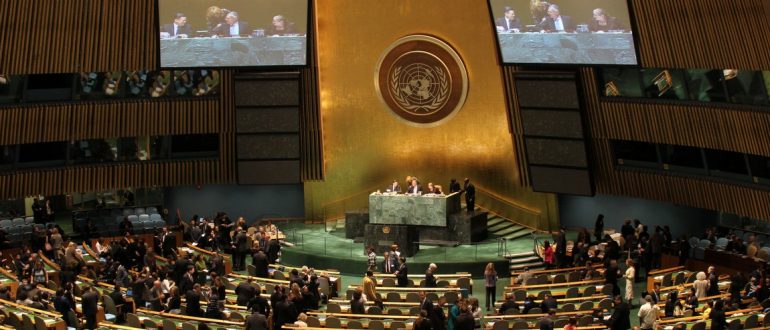
German Professor Elected to the UN International Law Commission
During the 6th committee of the 71st session of the United Nations General Assembly, the focus this year remained on the work of the United Nations’ International Law Commission (ILC). The ILC, which was initiated by the General Assembly in 1947, is set to implement the objective stated in Article 13 of the United Nations Charter “to encourage the progressive development and codification of international law”. More than 43 years after the two German states joined the United Nations, Germany still sees itself as committed to this objective today through constructive and intensive cooperation with the ILC.
This year’s meeting was a very special one for another reason: on 3 November 2016 the members of the ILC were elected for their next term. The International Law Commission is comprised of 34 members who, according to the ILC statutes, must have recognised competency in international law. The statutes also envisage that the ILC should represent the main forms of civilization and key legal systems around the world. Each UN member state could nominate candidates for the election and the members voted on these in a secret ballot – 49 candidates had applied for the 34 spaces.
The German candidate, Professor Dr. Georg Nolte from the Humboldt University Berlin, was elected to the ILC in the first and only vote with the second highest number of votes for any candidate (167 of in total 193 votes) at the General Assembly. Prof. Nolte was nominated for this position on 29 October 2014 by the Federal Cabinet and has been an ILC member since 2007. After the successful election, he will now be a representative in the Commission for his third period in office, which lasts another five years (Quinquennium 2017-2021). This outstanding result is an expression of the appreciation that Prof. Nolte has gained in nearly ten years of active work in the International Law Commission – but at the same time is also a huge success for Germany as a member state of the United Nations. As a special rapporteur, Prof. Nolte was able to bring the issue of “Subsequent agreements and subsequent practice in relation to the interpretation of treaties” to its first reading by the ILC within just five years and will now continue the work.
Of course in addition to the election, the focus was also on the nine issues that the International Law Commission had dealt with in its 68th meeting from 2 May to 10 June and from 4 July to 12 August 2016 in Geneva. Having completed an impressive amount of work, the issues of “Protection of persons in the event of disasters” and secondly “Identification of customary international law” as well as Prof. Nolte’s subject were completed on first reading. Historically, many important international conventions that have now become the foundation for international law go back to the preparatory work undertaken by the Commission. In many other cases, the work completed by the ILC has been recognised as applicable customary international law. They therefore are of key importance for codifying and developing international law – completely in line with the Commission’s objectives.
In the 6th committee of the General Assembly, Germany made statements this year on five of the issues currently being dealt with by the ILC that can be called up on the United Nations website: in addition to the three already stated, these include “Crimes against humanity” and “Immunity of State officials from foreign criminal jurisdiction”. Finally, 2017 will be a special year for the Commission: it celebrates its 70th anniversary.
This article was published in January’s issue of the Diplomatic Magazine.
